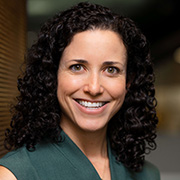A .gov website belongs to an official government organization in the United States.
A lock () or https:// means you've safely connected to the .gov website. Share sensitive information only on official, secure websites.

Climate change and air pollution are linked in several ways, including that they both stem from anthropogenic fuel combustion, are leading risk factors for global public health, and contribute to health inequities. Novel geospatial data sources including satellites and models are enabling greater availability of information on exposure levels and risks for populations globally and within individual cities, including in places with limited ground monitoring. This talk will address how these novel geospatial datasets can be leveraged to address health impacts and inequities associated with air pollution and climate change at municipal, national, and international scales.
Dr. Susan Anenberg is a Professor and Chair of the Environmental and Occupational Health Department at the George Washington University Milken Institute School of Public Health. She is also the Director of the GW Climate and Health Institute. Dr. Anenberg's research focuses on the health implications of air pollution and climate change, from local to global scales. She currently serves on the U.S. Environmental Protection Agency's Science Advisory Board and Clean Air Act Advisory Committee, the World Health Organization's Global Air Pollution and Health Technical Advisory Group, and the National Academy of Science's Committee to Advise the U.S. Global Change Research Program. She also serves as President of the GeoHealth section of the American Geophysical Union. Previously, Dr. Anenberg was a Co-Founder and Partner at Environmental Health Analytics, LLC, the Deputy Managing Director for Recommendations at the U.S. Chemical Safety Board, an environmental scientist at the U.S. Environmental Protection Agency, and a senior advisor for clean cookstove initiatives at the U.S. State Department.
ALL Seminar attendees agree not to cite, quote, copy, or distribute material presented without the explicit written consent of the seminar presenter. Any opinions expressed in this seminar are those of the speaker alone and do not necessarily reflect the opinions of NOAA or CSL.